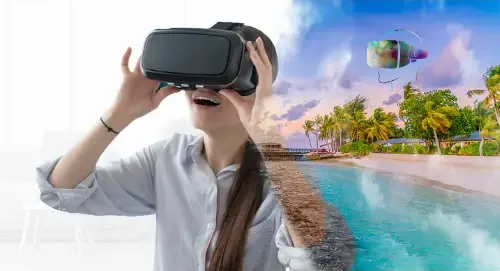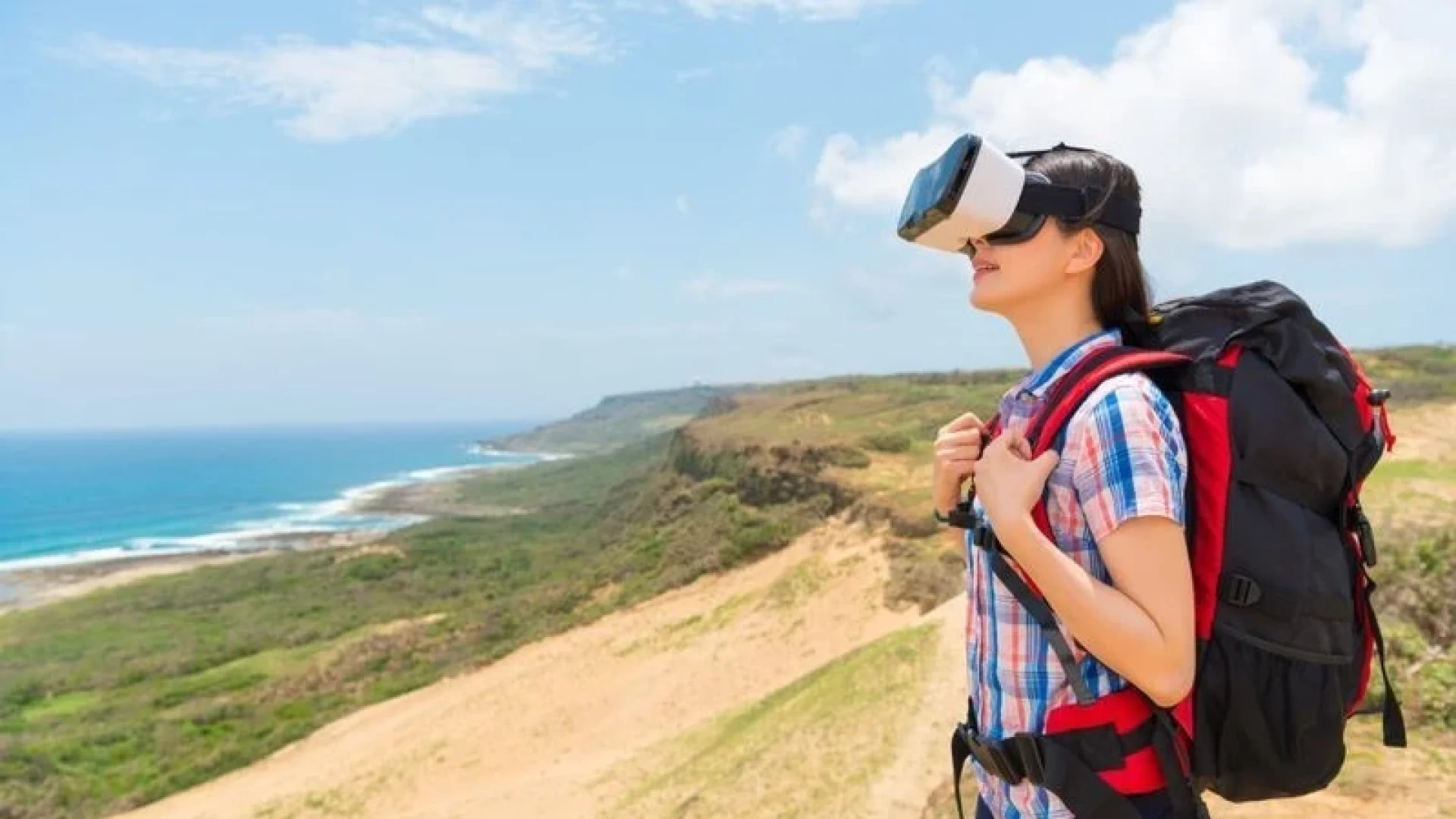In this amazing era of travel and tourism, the creation of AR & VR App Solutions has become an immense catalyst in the travel and tourism industry, revolutionizing how we plan, discover, and enjoy our travels.
Augmented reality superimposes digital charms on top of our reality, transforming hotel stays, removing communication obstacles, and offering smart navigation and increased convenience. Conversely, virtual reality transports us to breathtakingly realistic virtual environments, enabling smooth booking interfaces, virtual hotel tours, and life-changing vacation experiences.
Get ready to travel to heavenly destinations, as the revolutionary potential of augmented and virtual reality development completely changes how you travel and perceive the world. This is just the beginning of the adventure. Discover the infinite possibilities that await you as you explore the rapidly increasing boundaries of augmented reality and virtual reality in travel and tourism. 
This blog explores the impact of AR & VR App Development on the travel and tourism industries. However, before learning more about these developments and trends in the travel and tourism sectors, let’s take a quick look at what AR and VR are.
1. Augmented Reality:
As the name implies, augmented reality is an improvement in how we see things. It’s an interactive real-world experience where objects are enhanced and created to look better and bigger through computer graphics. For a better experience, one can see the real world as a computer-generated image. Usually, these pictures take the form of information, movies, and 3D Models.
There are countless applications for this technology. AR has significantly changed the travel and tourism sectors in several creative ways. According to Statista, by 2025, the global augmented reality industry is expected to expand from 5.91 billion to 198 billion dollars.
2. Virtual Reality:
With computer-generated graphics, virtual reality takes people to imaginary settings that imitate real-world settings. Moreover, virtual reality technology boosts the senses of sight, hearing, and touch, providing an incredible experience. The gaming, entertainment, and educational sectors have adopted virtual reality broadly because of its immersive style.
3. Applications of Augmented Reality in the Travel and Tourism Industry:

Easy access to Information

Better Marketing and Advertising

Enhance Convenience and Comfort

Make Tourist places more Attractive
3.1 Interactive Hotel Elements:
AR applies digital content to real-world surroundings, transforming hotel experiences. Visitors can get information about facilities, room configurations, and neighboring attractions via AR-capable smartphones. This interactive strategy provides a customized stay experience while increasing client engagement and happiness.
3.2 Hotel Marketing and Promotion Employing AR:
With the help of AR, you can sell and advertise your hotel’s services in a more sophisticated and eye-catching way. So when an interested customer explores the hotel, you can provide an overview of the rooms, accommodation options, and costs. This will attract clients, thus converting one-time visitors into devoted ones.
3.3 Complete Hotel Tutorial:
By using AR apps, you can visualize objects and get the real-time availability of items that are right in front of you. Utilizing this functionality, Pokemon Go has already grabbed people’s interest worldwide. It’s time for the hotel and travel industries. The hotel smartphone apps can offer an all-around hotel tour with additional AR elements by using augmented reality.
3.4 Using AR at Bars, Cafes, and Restaurants:
Depending on their advantages, restaurants, bars, and cafes can apply AR technology in various ways. By offering 360-degree views of each dish and its components, they can create a visually appealing and interactive menu. Additionally, you may locate pubs, cafes, and restaurants in the area by using AR smartphone applications.
3.5 Language Translations:
When visiting foreign countries, AR applications let visitors communicate easily. Users can quickly interpret menus, advertisements, and conversations by using real-time translation tools. Through this, language barriers are removed, making it easier for visitors to proceed through unexpected circumstances.
3.6 Quick Navigation:
Through the inclusion of contextual knowledge and current time directions, augmented reality-based navigation solutions streamline travel procedures. Moreover, travelers may depend on augmented reality (AR) apps to access interactive maps, favorite destinations, and transport schedules when touring a new city or navigating airports. As a result, travel is more convenient and enjoyable.
3.7 Increased Convenience:
AR simplifies several travel-related chores, including reserving tickets and creating arrangements. With AR overlays, users can explore locations, places to stay, and activities, which helps with well-informed decision-making. AR-enhanced travel guidebooks provide unique suggestions based on user preferences to further improve the trip planning process. To enjoy affordable AR services, Click Here.
4. Applications of Virtual Reality in the Travel and Tourism Industry:
4.1 Virtual Tours of Hotels:
Virtual reality (VR) makes it possible for potential customers to virtually tour hotels and other lodging establishments, viewing rooms and amenities up close. By means of immersive 3D experiences, tourists are able to envision their trip, evaluate the facilities, and make well-informed reservations. Moreover, virtual previews increase client satisfaction and booking conversions.
“VR is going to change the way both many of the things we do today and some new and important areas are transformed, like tourism.” Shaun Collins, CEO, CS Insight.
4.2 Virtual Booking Interface:
By providing users with user-friendly and immersive platforms, VR-based booking interfaces transform the reservation process. Within virtual settings, travelers can peruse destinations, evaluate lodging options, and make reservations for flights or lodging. Furthermore, this smooth VR integration makes travel planning easier and increases user engagement.
4.3 Virtual Travel Experience:
From the comfort of home, VR takes users to remote locations and attractions, providing immersive travel experiences. Travel agencies or content developers can construct virtual experiences for users to observe, whether they are exploring historical places or natural wonders. Suitable for a wide range of tastes and demographics, this virtual travel alternative offers accessibility and ease.
Final Words!
Within the dynamic field of travel and tourism, the incorporation of augmented reality (AR) and virtual reality (VR) technology has caused an important change in the way tourists plan their trips. Through interactive elements that improve convenience and immersion, augmented reality enhances physical environments with digital overlays. In the meantime, virtual reality is transforming tourist exploration of locations and lodging by immersing users in vivid settings.
Moreover, with continued development, these technologies have the potential to completely transform the travel and tourism sector, propel business expansion, and raise consumer satisfaction levels. In this revolutionary voyage, Euphoria XR is a shining example of innovation, providing unmatched AR/VR Development Services that open up new avenues for both travel agencies and enthusiasts.
Join us as we are ready to explore the wonders of augmented reality development and virtual reality development in the travel and tourism industry. In this innovative journey, Euphoria XR distinguishes itself as a top Metaverse Development Company and also AR/VR app solution provider, thus creating new opportunities for both travel agencies and tourists.
Frequently Asked Questions FAQs:
What are the qualities of a good AR/VR app solution provider?
A reliable provider of AR/VR app solution should have these qualities: AR/VR development expertise and experience, adaptability and customization to satisfy customer needs, and client-centered methodology.
Difference between virtual reality development and augmented reality development.
Virtual reality development generates complete immersive digital environments that replace the real world, while augmented reality development overlays the virtual content onto the real world, increasing the user’s view of the surrounding things.
How do you choose the right metaverse development company for your business?
When selecting a metaverse development company, make sure to clarify your project objectives, look for businesses with relevant experience, review portfolios and feedback from customers, talk about terms and pricing, set up consultations, and ultimately follow your gut.















